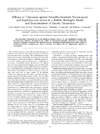Please use this identifier to cite or link to this item:
https://accedacris.ulpgc.es/jspui/handle/10553/71632
| Title: | Efficacy of Telavancin against Penicillin-Resistant Pneumococci and Staphylococcus aureus in a Rabbit Meningitis Model and Determination of Kinetic Parameters | Authors: | Acosta Arbelo, Félix Stucki, A. Gerber, P. Cottagnoud, M. Cottagnoud, P. |
UNESCO Clasification: | 310907 Patología 320505 Enfermedades infecciosas |
Keywords: | Penicillin-resistant pneumococci Rabbits Telavancin Meningitis |
Issue Date: | 2006 | Journal: | Antimicrobial Agents and Chemotherapy | Abstract: | The penetration of telavancin was 2% into inflamed meninges and ca. 1‰ into noninflamed meninges after two intravenous injections (30 mg/kg of body weight). In experimental meningitis, telavancin was significantly superior to vancomycin combined with ceftriaxone against a penicillin-resistant pneumococcal strain. Against a methicillin-sensitive staphylococcal strain, telavancin was slightly but not significantly superior to vancomycin. The continuous spread of penicillin-resistant pneumococci worldwide represents one of the major challenges for clinicians and infectious disease specialists. The epidemiological situation in Europe varies considerably. Increasing rates of penicillin resistance are observed everywhere. Although some countries in the northern part of Europe have a relatively low percentage of penicillin-resistant pneumococci, the highest rates have been reported from Hungary, with over 50% of the strains being penicillin resistant, followed by Spain and Portugal (1). Increasing rates of penicillin resistance have been registered in the United States as well in recent years, with resistance rates over 34% in some regions (3). In addition, resistance to cephalosporins has further jeopardized the therapeutic options for penicillin-resistant strains (11). Generally, β-lactam antibiotics remain the first-line drugs for the treatment of pneumococcal diseases, except when their penetration into target organs might be insufficient, as is the case in meningitis. Based on actual guidelines, the empirical treatment of pneumococcal meningitis consists of a combination of an expanded-spectrum cephalosporin with vancomycin, especially when resistant strains are suspected (7, 8). Another challenging issue remains the treatment of staphylococcal meningitis. Staphylococcus aureus is the cause of about 1 to 9% of all cases of bacterial meningitis, with mortality rates ranging from 14 to 77% (9, 14). In the majority of cases, meningitis due to Staphylococcus aureus is a nosocomially acquired disease and occurs in patients after neurosurgical procedures or head trauma. S. aureus is the second cause of cerebrospinal fluid (CSF) shunt infections (12 to 19% of the cases) (9, 14). In patients with community-acquired S. aureus meningitis, underlying conditions include sinusitis, endocarditis, abscess, cellulitis, osteomyelitis, and pneumonia. The rate of mortality in patients with S. aureus meningitis has been reported to be higher when the path of infection is hematogenous rather than postoperative (56% versus 18%) (6). In the case of β-lactam allergy or when methicillin-resistant S. aureus strains are suspected, vancomycin remains the treatment of choice. Telavancin is a recently developed lipoglycopeptide with excellent and rapid bactericidal activity against the most relevant gram-positive microorganisms (10). The aim of this study was to evaluate the activities of telavancin against a penicillin-resistant pneumococcal strain and a methicillin-sensitive staphylococcal strain in experimental meningitis and to determine the kinetic parameters of its penetration into the CSF. | URI: | https://accedacris.ulpgc.es/handle/10553/71632 | ISSN: | 0066-4804 | DOI: | 10.1128/AAC.50.2.770-773.2006 | Source: | Antimicrobial agents and chemotherapy [ISSN 0066-4804], v. 50 (2), p. 770-773 | URL: | http://dialnet.unirioja.es/servlet/articulo?codigo=1422345 |
| Appears in Collections: | Artículos |
WEB OF SCIENCETM
Citations
41
checked on Jun 8, 2025
Page view(s)
144
checked on Jul 12, 2025
Download(s)
112
checked on Jul 12, 2025
Google ScholarTM
Check
Altmetric
Share
Export metadata
Items in accedaCRIS are protected by copyright, with all rights reserved, unless otherwise indicated.
